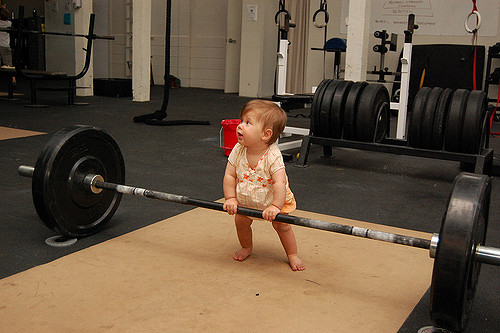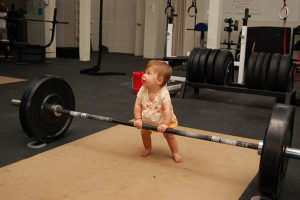We’ve all got habits that we do.
We’re unaware of them, but they are sabotaging our best efforts.
It takes less than a second, for the habits to kick in and work their effect on us. Moments, that we don’t realize we give in.
Or we don’t realize their effect on us.
What are 5 little habits that you do that don’t help you?
Comparing yourself to others.
I was in the gym the other day, and I saw this cute girl. Not the one in the picture above.
I saw her cheerful smile, high-fiving her trainer, and being a ball of sunshine.
Doing box jumps as high as her shoulders.
BAM!
Deadlifting 150 pounds.
BAM!
Then, deadlifting 170 pounds.
BAM!
And here I was getting ready to bench press a hundred pounds, before doing my planks.
I hated myself.
I felt like the baby in the picture.
I thought to myself: “Why couldn’t I do that? Surely I could, but I still have to recover from my back injury!”
I felt the need to rush through my exercises, and to try what she was doing. Even though I knew I wasn’t ready.
At least I got pushed by that scene. Two years ago, if I’d have seen her, I’d have thought to myself that: “No way can I do that! I’m not built to be a fit person.”
I wouldn’t even tried. Because I compared myself to her, and found myself lacking.
That feeling happens in an instant, it’s a habit of comparing ourselves to other people, and of attaching value judgements and negative labels based on that comparison.
I see other people doing what I can’t do know, and think to myself that if I’m not able to do that, then I’ll never be able to. Ability has to come naturally. I’m not a natural.
All that really means is that we’re afraid to fail. We’re afraid to work hard to get to where other people are, because we might not get it.
What I was doing is being unfair to me. She was training far longer than me, and without break due to injury, unlike me and my lower back.
I found myself comparing my day 1 to her day 100. There’s just no comparison. It’s better to compare my day 100 to my day 1, instead.
Don’t compare yourself to others, or use others as a baseline for what you can or can’t do.
Use yourself and your growth, instead.
Only thinking about the short-term.
This little habit hurts us because it pushes us to lose sight of the long-term, and make decisions that would grant us satisfaction now, but regret later.
Yesterday, I gave in and ate a chocolate bar. It felt good, and I was happy, but in the long-run, I wasn’t sticking to my diet plan, and will find the chocolate bar as fat on my tummy later on. Ugh.
You can’t un-eat empty calories. You can only feel regret.
I used to believe I’ll never be a fit person, so I ate whatever I wanted, with no exercise, and diligently did my work, sitting all day.
I gave up on myself, and just indulged.
Two years later, I wasn’t overweight by a lot, but I had a lot of fat, didn’t have a lot of confidence in myself, didn’t have a lot of energy, and developed a lower back problem.
And that was just two years. What more other people who have been struggling for longer?
If all we thought about was the short-term, then we wouldn’t give ourself the time and space to learn new skills, or develop strengths and mindsets.
We’d all be stuck with our natural talents, and shun what we can’t do great, even without prior experience or knowledge.
But the world doesn’t work that way. You might have weaknesses holding you back, that over time, with conscious effort, you can overcome.
A long-term orientation doesn’t mean not thinking about the now. It means doing what needs to be done now, to reach a goal in the future.
And it’s not a one time thing as well. It’s not about instant results.
It’s about having faith in the process, and how small actions, accumulated over time, lead to big changes.
Have a long-term orientation, at the same time doing what needs to be done now.
Always seeking permission.
I grew up with very overprotective parents. And just saying that was an understatement.
Nothing got done in the house without my parent’s permission, and if something was, I’d never hear the end of it, a sermon that would just drag on and on.
And to the 7 year-old me, that was a terrifying sight.
So then I learned early on to always ask for permission, with whatever it was that I had to do, or wanted to do.
Little did I know, that in the future, my wanting to keep the peace as a child, kept me locked and bound as an adult.
It became deeply ingrained in me that whenever I wanted to start something, or do something, I always had to seek permission. That it would be alright for either me, or the people involved.
But in the real world, there is only one person who can fully give you the permission that you want.
It’s you.
I figured out I had to stop seeking permission from other people, when other people didn’t want to give me permission.
I figured it was better to ask for forgiveness, rather than permission. All along, I could have given me the permission that I needed.
If I wanted to do something, all I had to do was to give my full-belief “YES!” And that was it.
Don’t wait for others to give you permission.
You are fully capable of giving permission to yourself.
The need to be right, all the time.
I always wanted to be right. I mean, who ever wanted to be wrong?
But I didn’t have to be right, all the time.
Or the right answers, didn’t always have to come from me, it could come from someone else.
That’s OK, too.
And it relieved me of a tremendous burden that I felt on my shoulders and in the bottom of my gut, that I had to be right, all the time.
Because if I wasn’t right, that meant I was less of a person.
That being wrong had an impact on my self-esteem, and self-worth.
That if I was wrong, people wouldn’t love me, they’d reject me, and never talk to me.
I found all of that to be not true.
Worse, I found all of that to be in my head. All habits that strike when my pride or fear rear their heads, and push me to force my way to be right.
Even, when I was clearly in the wrong.
And that only got me into more fights and wounded relationships, and messed up my chances to repair them.
Because I felt the need to always be right.
Instead of forcing my way to always be right, I found it more helpful to find out what the truth was.
To listen to others and get to know them more, what they wanted, feared, hoped for and dreamed of.
Whether you were right, or wrong, won’t really be remembered by people.
What they remember is how you made them feel.
Waiting until we’re confident.
Because if we wait until we’re confident, or confident enough, we won’t ever get started.
Or we would’ve wasted too much time waiting.
We’re giving in to fear.
Right now, this is the little habit that’s handicapping me. I always have to build confidence, and wait a little bit to compose myself before I do something new, or something that I’m anxious or nervous about.
But I can’t wait forever, and people don’t call themselves, and articles don’t get written by themselves.
I still doubt my ability to write valuable and readable articles. I’m not all that confident.
Yet, I write, and hit publish, even when it frightens me.
Fear, low self-esteem, that’s my “middle finger up” to you.
Now, to calling people.
Don’t wait until you’re confident.
Learn out loud, and just do, build the confidence and figure things out along the way.
Build habits that help you.
With more self-awareness, begin to be aware of what’s helping you, or what’s sabotaging you.
Upgrade your habits into rituals, with more awareness, conscious effort, and direction.
Change your beliefs and mindset to support what you want to do, instead of going against yourself, and trying to prove yourself wrong.
Make whatever it is that you do in life, help you, instead of hindering you.
Life’s too short to be struggling with yourself.
Help yourself.
What’s a little habit you do that’s not helping you? Please share in the comments below!


Leave a Reply